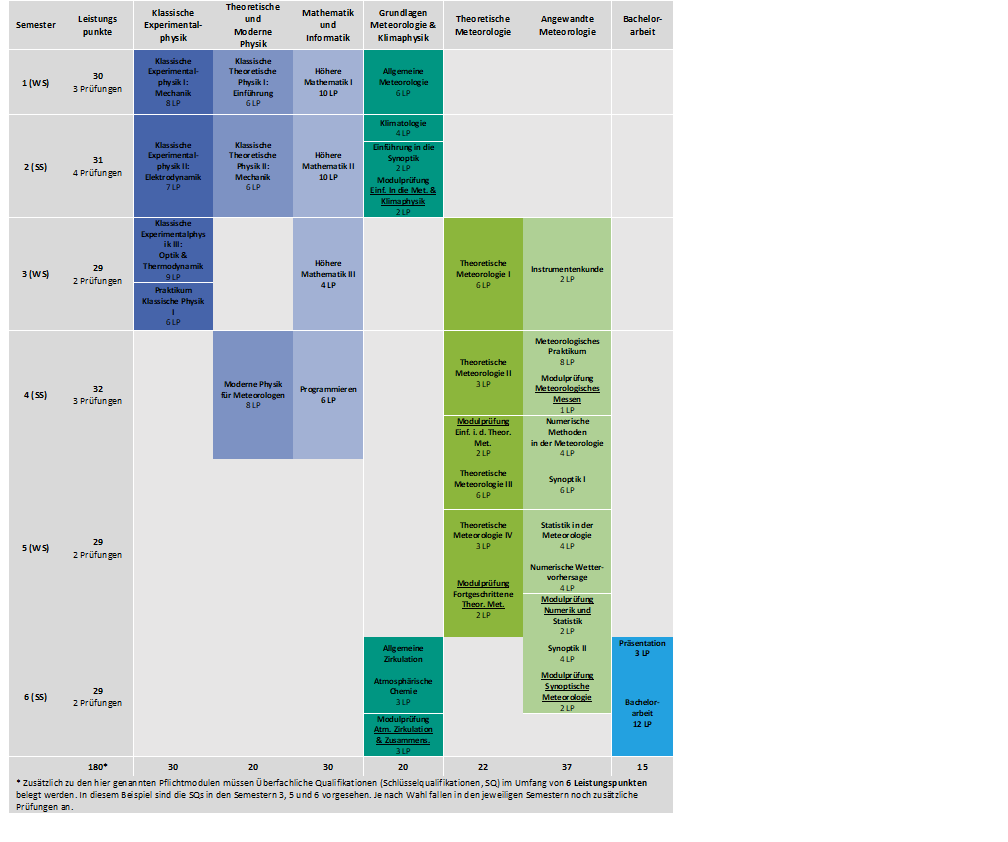Course of studies

The study of meteorology is a physical study with a special focus on the physics of the atmosphere. The first three semesters of the bachelor's programme are therefore almost identical to those of the bachelor's programme in physics and consist in particular of courses in physics and mathematics with the corresponding examination requirements.
In addition, students acquire basic meteorological knowledge in the first semesters. Starting in the fourth semester, the knowledge of meteorological correlations is taught in courses on theoretical meteorology, synoptics (meteorology) numerics and statistics as well as on the circulation and composition of the atmosphere. Through the meteorological practical course and the seminar on weather forecasting, students learn how to apply and implement the acquired meteorological knowledge.
In the context of the meteorological practical course and the bachelor thesis, students can learn how to handle meteorological data sets. This includes the application of statistical methods, graphical representation and the use of special software (data processing and programming). Furthermore, there is the possibility to participate in international measurement campaigns.
The acquisition of additional key qualifications (e.g. language, writing, presentation courses) is obligatory. Good knowledge of the English language should be available or acquired. The standard period of study is 6 semesters. However, KIT makes every effort to give students the opportunity to adapt the curricula to individual needs and to decelerate them if necessary.
Meteorology is a small subject compared to physics or computer science. At KIT, a maximum of 50 students per year start studying meteorology. The excellent supervision ratio and the proximity to current research work of the institute thus create the best study conditions.
In addition to the Bachelor's program in meteorology, the KIT also offers the Master's program in meteorology. Although the bachelor's program is an independent, professionally qualifying degree, the KIT strives to establish the master's degree as the standard degree.
The master's degree program in meteorology builds on the bachelor's degree program. In it, knowledge is further broadened and deepened. A large part of the course is devoted to scientific work, including the preparation of a Master's thesis. Furthermore, interdisciplinary links with other natural sciences (e.g. physics, geophysics, geology, chemistry, ...) are possible. If students choose these as minor subjects, interdisciplinary scientific competences can be acquired. The standard period of study in the Master's is 4 semesters.
Study plan
The Bachelor's programme is formally divided into 8 subjects, which in turn can be classified into 4 superordinate subject areas:
- Meteorology,
- Physics,
- Mathematics and Computer Science and
- Interdisciplinary qualifications.
The subjects are again divided into modules consisting of several courses (a detailed description of the modules and courses can be found in the module handbook Bachelor Meteorology and Physics):
Meteorology
- Basics of Meteorology
The focus is on acquiring the physical fundamentals of meteorology and climatology as well as a fundamental understanding of the relevant physical and chemical processes taking place in the atmosphere, the Earth's climate system and the essential elements of weather events. - Theoretical meteorology:
Students acquire knowledge of hydro- and thermodynamic processes in the atmosphere on the basis of physical laws as well as associated mathematical solutions. In addition, they learn theoretical models for the description of atmospheric phenomena and radiation processes in the atmosphere. - Applied Meteorology:
Practical and theoretical basics for the application of different meteorological measurement methods as well as the evaluation of measurement data are tested. The physical analysis, diagnosis and forecast of current weather events will be taught by means of theory and a weekly analysis and discussion of the current weather. Lectures on numerical methods, which are developed in different programming languages, and statistics create the basis for working with numerical models. - Bachelor's thesis:
In the bachelor thesis, each student deals with a current research topic, independently works out results, which are compiled and presented in a scientific paper.
- Basics of Meteorology
Physics
- Experimental physics:
Here students acquire knowledge of the experimental foundations and mathematical description of classical mechanics, hydromechanics, special relativity, classical electrodynamics, optics and classical thermodynamics. In the practical course, students perform physical measurements and experimental setups in the fields of optics, electrodynamics and electronics. - Theoretical and modern physics:
In Classical Theoretical Physics, students acquire basic mathematical knowledge and skills using the example of simple mechanical problems, the treatment of the analytical mechanics of point masses, rigid bodies and the continua at the centre. In the lecture on modern physics, students learn about the following topics: Special relativity, quantum physics, atomic physics, solid state physics and nuclear and elementary particle physics.
- Experimental physics:
Mathematics and Computer Science
- Higher mathematics:
Students acquire knowledge in the fields of analysis, vector analysis and linear algebra as well as function theory, differential equations and integral transformations. - Programming:
Basic knowledge of a programming language, currently C++, and the learning of independent program development are the focus of this course. It consists of a lecture, a room exercise and a practical part in which you program yourself and present your programs to a tutor once a week.
- Higher mathematics:
interdisciplinary qualifications (e.g. scientific writing/presentation, language courses or working techniques)
